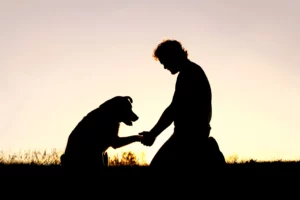Losing a pet is one of the most difficult things a person can go through. Pets are members of our family, and their deaths leave us feeling lost and alone. If you are grieving the death of your pet, know that you are not alone. Millions of people experience the same pain every year. This blog post will offer some tips on how to cope with your loss and move on with your life.
Contents
Why Does It Hurt?

Losing a pet can be devastating because we form such strong bonds with them. Pets provide us with companionship, love, and security. They are always there for us, no matter what. When they die, it feels like a part of our family has been ripped away from us. We may feel like we will never be able to cope with the loss.
The nature of your pet’s passing can also influence the way you react and cope with this loss.
- In the instance of an anticipated and expected event such as old age, ailments, or some other medical complication, one has time to mentally prepare for witnessing the last moments of their pet. Although it can be bittersweet to know that the time of departure is nearing, it gives time to cherish whatever time is left to spend with your furry friend.
- In case of a sudden and unexpected passing due to unforeseen factors like an accident, attacks, or any such unfortunate events, it is normal to feel lost, overwhelmed, scared, confused, or hopeless.
Despite the circumstances, grief is inevitable. We must accept the fact that every start has an end. What is born, eventually dies. These harsh realities may sound cruel but it is a hard pill we must all swallow.
Stages Of Grief
There are five stages of grief that were first proposed by Dr. Elisabeth Kübler-Ross in her book On Death and Dying. The five stages are denial, anger, bargaining, depression, and acceptance.
Denial
The first stage of grief is denial. This is when we try to convince ourselves that our pet is still alive or that their death is just a bad dream. We might even go so far as to believe that if we ignore their death, it will go away. This is a defense mechanism our mind uses to protect us from the pain of loss.
Anger
The second stage of grief is anger. We might be angry with ourselves, with God, or with the world in general. We might even be angry with our pet for leaving us. This is a normal part of the grieving process and it is important to allow yourself to feel this anger. If you try to bottle up your emotions, it will only make the grieving process harder.
Bargaining
The third stage of grief is bargaining. This is when we try to make deals with God or fate to bring our pets back. We might say things like “if only I had been there sooner” or “if only I had taken them to the vet more often.” We might even try to make deals with God, promising that we will be better people if only he will bring our pet back.
Depression
The fourth stage of grief is depression. This is when the reality of our loss sets in and we start to feel hopeless. We may lose interest in things that we used to enjoy and withdraw from friends and family. We may even start to think about death ourselves. This is a normal part of the grieving process and it is important to seek help if you are feeling suicidal thoughts.
Acceptance
The fifth and final stage of grief is acceptance. This is when we come to terms with the fact that our pet is gone and we will never see them again. This doesn’t mean that we are okay with their death, it just means that we have accepted it. We might still feel sad from time to time but eventually, the pain will start to lessen and we will be able to move on with our lives.
It is important to understand that these stages are not linear. You may experience them in any order or you may move back and forth between them. There is no “right” or “wrong” way to grieve.
Tips For Coping

There is no one right way to deal with the loss of a pet. Grief is a very personal experience and everyone copes in their way. Some people find comfort in talking about their pets and sharing memories with others who have also lost pets. Others prefer to keep their pain private and deal with it in solace while others require additional social support for dealing with this loss.
While altering your coping strategies according to your willingness, here are some tips one can make use of:
- Seek professional help. A grief therapist will guide you on how to navigate through your sadness in an empathetic and healthy manner. Talking to a mental health professional can also manage grief symptoms from worsening with timely intervention.
- Do not try to bottle up your emotions or pretend as if nothing has happened. Allow yourself to feel the pain and sadness. Cry if you need to. It is also important to talk about your pet and your feelings with others.
- Find a friend or family member who will listen to you and offer support. You can also join a support group for pet owners who have lost their pets. These groups can be found online or through your local humane society.
- It is also important to take care of yourself during this difficult time. Make sure you are eating healthy foods and getting enough sleep. Exercise can also help you to cope with your loss. It is important to find activities that make you happy and help you to relax. This can be anything from reading, taking walks, or listening to music.
- Don’t rush into getting a new pet. Making hasty decisions to fill a void may seem like a valid option, but it may build up feelings of guilt, resentment, incapability, or even anger in the long run.
- Remember that it is okay to feel happy again. You may always miss your pet, but eventually, the pain will start to lessen. The memories of your pet will bring you more happiness than sadness. Allow yourself to move on and enjoy your life once again.
Conclusion
Losing a pet is never easy. It can be a very painful and difficult experience. However, it is important to remember that you are not alone. There are millions of people who have experienced the same pain as you. With time, the pain will lessen and you will be able to remember your pet with happiness instead of sadness. If you find yourself struggling to cope with your loss, seek professional help. Talking to a therapist or joining a support group can be very helpful. Remember to also take care of yourself during this difficult time by eating healthy, getting enough sleep, and exercising. Allow yourself to feel happy again when the time comes. Your pet would want nothing more than for you to be happy and live your life to the
A Word From Therapy Mantra
Your mental health — Your psychological, emotional, and social well-being — has an impact on every aspect of your life. Positive mental health essentially allows you to effectively deal with life’s everyday challenges.
At TherapyMantra, we have a team of therapists who provide affordable online therapy to assist you with issues such as depression, anxiety, stress, workplace Issues, addiction, relationship, OCD, LGBTQ, and PTSD. You can book a free therapy or download our free Android or iOS app.


